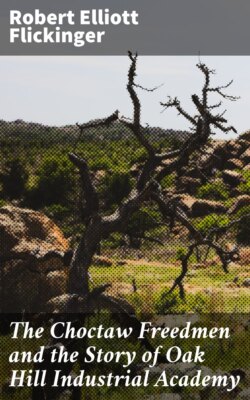Читать книгу The Choctaw Freedmen and the Story of Oak Hill Industrial Academy - Robert Elliott Flickinger - Страница 51
На сайте Литреса книга снята с продажи.
DIFFERENT STANDPOINTS.—REPRESENTATION IN CONGRESS.—13th, 14th AND 15th AMENDMENTS.—NEGRO SENATORS AND REPRESENTATIVES.—DISFRANCHISEMENTS.—RESULTS CONTRARY TO EXPECTATION.—PROVIDENTIAL LEADING OF JOSEPH, ISRAEL, NEHEMIAH AND DANIEL SUGGESTIVE.—A DIVINE MISSION.—THE FREEDMAN'S FRIENDS.—FRIENDLY COUNSELS.—THE GOLDEN RULE.
Оглавление"Justice and judgment are the habitation of thy throne; mercy and truth shall go before thy face."
"Righteousness exalteth a nation but sin is a reproach to any people."
The "Problem of the Negro" is an old and familiar phrase. It relates to the fact, that, however many and great have been the benefits derived from his labor and loyalty, the best management of him has been a troublesome problem to the statesmen of this country, ever since the declaration of independence, and especially the Freedman, since his emancipation.
Like a prism or cube, this problem has several sides, but unlike these symbols, its various sides are unlike each other. The solution of it has always appeared to be different when viewed from different angles of vision. Observers in one part of our country unite in saying, "this is the best way to solve this problem," while others in another section insist, they know a better way. The statesman views it from one point of view, the labor leader from another and the Christian philanthropist from still another standpoint.
The first part of this problem, the one relating to the fact of his freedom, has already been solved. The solution of this introductory part of the problem caused preliminary struggles in Kansas and other places, including the Civil War. It served to bring out that which was noblest and best in Harriet Beecher Stowe, William Lloyd Garrison, Frederic Douglass, Henry Ward Beecher, Horace Greeley, Charles Summer, Abraham Lincoln and others.
The parts that remain to be solved relate to his uplift from ignorance, poverty and degradation, to the attainment of the ability to support himself, by a fair chance in the labor market, and the enjoyment of approved educational, religious and political privileges.
He has been accorded the right to own property, and is enjoying that right to the full extent of his ability to acquire and hold it.
He has been accorded limited educational and religious privileges, and has made a very commendable progress along both of these lines.
It is at this point we reach the difficult and unsolved part of the problem.
The intelligent and prosperous portion of them in the South, though native and loyal Americans, are discriminated against, and denied rights and recognitions, that are accorded other nationalities, though illiterate. The popular reason assigned, for locally withholding from all of them certain privileges of citizenship, is the fact that a great number of them continue to be illiterate.
In several of the states the Freedman is denied the privilege of enjoying the instruction of competent white teachers in their state and public schools, and in all of them he is prohibited from attending white schools, as in Pennsylvania and other northern states. The discriminations against them are so general, that it is almost impossible for any of them to acquire skill as workmen, or become fitted to serve their own people in the professions, except from those of their own number, or institutions of learning provided specially for them.
